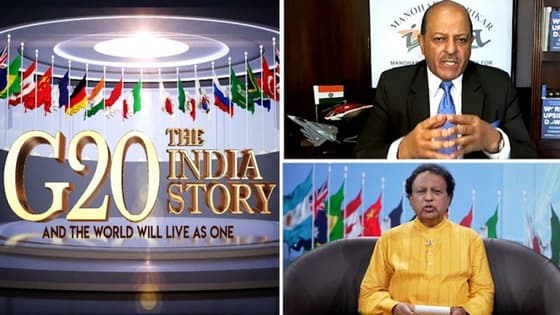
G20 The India Story: "1.4 billion Indians introduced to rest of the world through G20 Presidency"
Asianet News Network's special series, "G20 The India Story," delves into the preparations for the upcoming G20 Summit in New Delhi, scheduled for September 9-10.
Asianet News Network's special series, "G20 The India Story," delves into the preparations for the upcoming G20 Summit in New Delhi, scheduled for September 9-10. This summit is a significant event, the likes of which India hasn't hosted since the 1983 Non-Aligned Summit. With its diverse topics, distinguished attendees, and extensive year-long preparations, this summit holds great importance. In the first episode of the series, TP Sreenivasan, Former Ambassador of India, engages in an in-depth discussion about the G20 Summit 2023 with Former Ambassador Sujan Chinoy, who is currently serving as the Director General of the Manohar Parrikar Institute for Defense Studies and Analyses, T20 Chair - G20 India.

When asked about what sets the G20 Summit 2023 in India apart, Sujan Chinoy emphasized that Prime Minister Narendra Modi has steered India's G20 Presidency with the foundational principle of Vasudhaiva Kutumbakam - One World, One Family, One Future. "It's a huge plus and moreover the PM of India has been making great efforts and so have other leaders and functionaries to reach out to the Global South. In fact, the one great achievement of India is not just to emerge as a voice of Global South, but also to genuinely put the Global South agenda front and centre during our Presidency," he said.
Sujan Chinoy highlighted that India views the G20 differently from the UN Security Council (UNSC). While the UNSC deals with peace and security matters, the G20 is primarily focused on global economic development and macroeconomic stability.
"The UNSC deals with issues of peace and security, but it is the G20 that must focus on issues to do with economic development and macro-economic stability around the world and now when the world is in such great crises, when all the key vectors of globalisation are challenged - whether it is trade, technology, finance or movement of human resources - when these are so greatly challenged, when the war in Ukraine has only accelerated some of the divisions and difficulties that were already in play as a result of Sino-US friction and the enormous adversity created by the Covid-19 pandemic... At this point of time, it is India that has succeeded in actually putting the key issues for instance debt distress, high interest rates, lack of food, fuel, finance and fertilizers for the developing countries. These have been successfully put on the agenda of the G20," said Chinoy.
He added, "This is for the first time an entire country has been involved in its Presidency. 1.4 billion people of India have been introduced to the rest of the world. The world has been made ready and prepared for a rising India through our Presidency. We have branded India successfully by ensuring that more than 200 events for the main leadership track for instance are held all over the country and that people, even in the districts, get a chance to introduce themselves, our cuisine, our culture, our soft-power, our products through this kind of interaction. This is an unprecedented level of engagement with our own people and people around the world in any G20 Presidency."
Also read: G20 Summit: Who are the attendees and absentees? Check full list here
When questioned about the potential envy from other countries, particularly China, Sujan Chinoy dismissed concerns stating, "In the case of China, I read that the Chinese have difficulties with millets - the reference to millets - why should anyone have problem with reference to millets. This is also the year of the millets as declared internationally. So it's not India's year of millets, it's actually an International Year of Millets. Then if there is a problem with regards to Vasudhaiva Kutumbakam, I see no reason why that should be resented."
"Don't forget, if China has a problem with Sanskrit, I'd be very surprised. 1400 years ago, Hiuen Tsang, the Chinese pilgrim and many other Chinese pilgrims came to India in search of knowledge and it's this language the same one that gives us Vasudhaiva Kutumbakam that gave China those scriptures which they took back in order to inform their own people of our Hindu-Buddhist thought and philosophy. You're more likely to hear Sanskrit chants, certainly not in Mandarin, in any Chinese-Buddhist monastery even today," the former ambassador added.
Also read: G20 Summit: Five reasons why Chinese President Xi Jinping is not visiting India